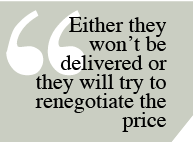The opportunity to sell power direct via corporate power purchase agreements has sparked interest but one investor has warned many will fail to proceed.
This is an extract of an interview with Mike Bonte-Friedheim, founding partner and group chief executive of specialist investors of NextEnergy Capital, where his specific roles include being on the investment committee of the NextEnergy Solar Fund (NESF), which has raised £700 million to invest in UK solar and currently owns 87 solar plants with a total capacity of 691MWp. Subscribers can log in to read the full interview here.
 Bonte-Freidheim agreed that there is an emerging market for PPAs in the UK but said: “What we have found is that most of those tenders take place at very unattractive prices for the electricity seller. They are well below what the market is, so we have shied away from those. In the bidding we put the numbers that we like and if someone is willing to offer lower prices that’s fine.”
Bonte-Freidheim agreed that there is an emerging market for PPAs in the UK but said: “What we have found is that most of those tenders take place at very unattractive prices for the electricity seller. They are well below what the market is, so we have shied away from those. In the bidding we put the numbers that we like and if someone is willing to offer lower prices that’s fine.”
Bonte-Friedheim identified two drivers for such low prices. One of those is the PR effect, “so if you are a big energy company and you want to show that you have won a PPA with a blue chip offtaker, you bid whatever price you want because you want to have a big press release and you want to get on the front page of your company report to hide all the other ugly stuff that you are doing.”
As for the second reason: “Business that are bidding so low, so aggressively, … they don’t have capital to build those assets and they think that by locking in a PPA they can then find the capital.” Neither applies to NESF. “We have sufficient capital to build those assets so we wouldn’t give up value to secure capital to build them… and we don’t need the PR of being green and hiding the oil and gas activities,” he said.
When I asked how many of the low-priced PPAs will fail to proceed, Bonte-Friedheim says: “There is a good chance that either they won’t be delivered or they will try to renegotiate the price and we have heard of some of that renegotiation of price already.”
He points out that in some cases the CPPA is “nearly a free option for the asset owner” with no penalty at all, or no significant penalty, if it is not delivered. A developer can hope that the price of building assets will continue to fall so he low price becomes deliverable. But if not, he says: “You can say sorry I didn’t make it and you don’t have any money on the hook – so it’s a free option to see what happens.”
With no penalty – Bonte-Friedheim says, of say £20 million or £30 million – for not supplying, “the buyer of that electricity, the other party of the PPA, is going to be naked in terms of the electricity supply”.
How widespread is the problem? “I think that most of the CPPAs that are significantly below the current market price of power are at risk. From our analysis, selling the electricity at those rates generates an investment return which is sub optimal for investors,” he said.
This is an extract from an interview in the February edition of New Power Report. Subscribers can log in to read more about his views on the maturing solar energy landscape.
Not yet a subscriber? New Power is a specialist report for anyone with an interest in the UK energy industry. We look in-depth at all the issues that have to be addressed to rebuild our industry – moving from our centralised high-carbon power system to one that will provide heat and power securely, affordably and with minimal carbon dioxide emissions. Contact [email protected] to find out more.